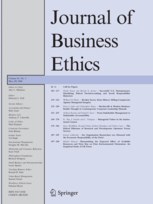
Ramdani, D. and van Witteloostuijn, A. (2012). The Shareholder-Manager Relationship and Its Impact on the Likelihood of Firm Bribery Journal of Business Ethics, 108(4):495--507.
-
Affiliated author
-
Publication year2012
-
JournalJournal of Business Ethics
We examine the impact on firm bribery of two corporate governance devices heavily studied in corporate governance research-i. e., separation of ownership and control, and equity share of the largest shareholder. In addition, we investigate the impact of the principal-owner's gender on firm bribery. From agency theory, we predict that firms with the owner also acting as a manager (owner-manager) are more likely to engage in bribery compared to their counterparts with separation of ownership and control. We argue that an increase of the equity share of the largest shareholder can either increase or decrease firm bribery likelihood depending on the net cost-benefit effect of such bribery actions. In addition, we predict that bribery is more likely to occur when the principal-owner is male rather than female. Using a rich dataset of the World Bank Enterprise Surveys of 2002-2005, we find that the equity share of the largest shareholder is negatively and male principal-owner is positively associated with the likelihood of firm bribery. Furthermore, we reveal that owner-manager is more likely to bribe when the principal-owner is male rather than female. We also observe that the effect of owner-manager is smaller as the equity share of the largest shareholder increases.